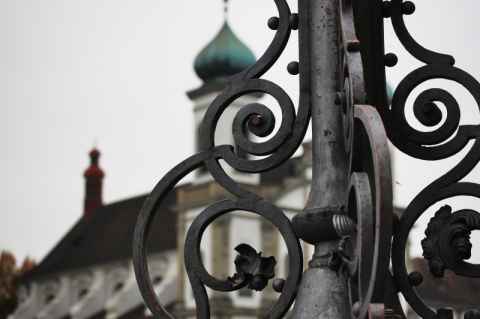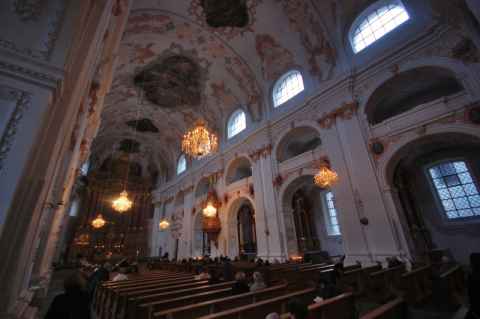Jesuitenkirche
The Jesuit Church of St. Franz Xaver lies on the south bank of the river Reuss, a couple hundred meters before it reaches the lake by Luzern. Franz Xaver[a], or Francis Xavier as he is known in English-speaking countries, was a co-founder of the Society of Jesus ("the Jesuits") in 1534. He did extensive missionary work in Asia - mostly in the Portuguese Asian Empire. He had great success in spreading Catholicism in India, but when he ventured into areas not yet visited by Christian missionaries such as Japan, the Moluccas and Borneo, he met with less success, due to the language barrier (Francis had to learn the local languages) and local opposition.
The Society of Jesus[b], or SJ for short, deserves some mention; simply because like their homies in Opus Dei[c], they turn up when you least expect it[d][1]. Their stated purpose is to work for the defense and propagation of the faith
- a goal they no doubt share with many Christians. However, the SJ tend to take this perhaps a bit more seriously than many others - as described here, where Eric Knapp tells the story of how he became a Jesuit:
I didn't know a lot about them aside from their stereotypes-"God's marines", "over-educated", "arrogant", and something to do with the Inquisition.
"Over-educated" and "arrogant". Well, talking with someone who claims to have discovered the true meaning of Christian Sacrifice
[g] can certainly be quite an experience - especially if you disagree, but that's theology. What the SJ certainly promote is conformity, though. The thirteenth article in Ignatius Loyola's Rules for Thinking with the Church reads as follows:
13. That we may be altogether of the same mind and in conformity with the Church herself, if she shall have defined anything to be black which to our eyes appears to be white, we ought in like manner to pronounce it to be black. For we must undoubtedly believe, that the Spirit of our Lord Jesus Christ, and the Spirit of the Orthodox Church His Spouse, by which Spirit we are governed and directed to Salvation, is the same;
We can react to such a strict obedience to doctrine with disbelief and scorn - and there is enough theocratic oppression in the world to justify both - but one should not dismiss doctrinal adherence as irrelevant or crazy. In The Gnostic Gospels, Elaine Pagels makes a convicing case for orthodox discipline of this kind being the main reason why the Catholic Church endured, survived and came to be the dominant branch of Christianity in the first millennium after Christ. While the end result may be a world that we would not want to live in, strict hierarchies have a kind of strength that looser, more network-like organizations lack: While fragile in their dependence on a top tier, they tend to make decisions fast and have an ability to make people do unpleasant things. While those "unpleasant things" frequently are of the kind done to others, it was in no small amount discipline that made the black men and women of the Civil Rights Movement stand up to oppression[i], despite risking their lives and health. There is evidence that the obedience is not an end unto itself, but a means to an end. The founding document, for example, seems to give quite some leeway in performing any other works of charity, according to what will seem expedient for the glory of God and the common good
:
The Formula of the Institute
"Whoever desires to serve as a soldier of God beneath the banner of the cross in our society, which we desire to be designated by the name of Jesus, and to serve the Lord alone and the Church, his spouse, under the Roman pontiff, the vicar of Christ on earth, should, after a solemn vow of perpetual chastity, poverty and obedience, keep what follows in mind. He is a member of a Society founded chiefly for this purpose:
to strive especially for the defense and propagation of the faith and for the progress of souls in Christian life and doctrine, by means of public preaching, lectures, and any other ministration whatsoever of the word of God and further by means of the Spiritual Exercises, the education of children and unlettered persons in Christianity and the spiritual consolation of Christ's faithful through hearing confessions and administering the other sacraments.
Moreover, he should show himself ready to reconcile the estranged, compassionately assist and serve those who are in prisons or hospitals and, indeed, to perform any other works of charity, according to what will seem expedient for the glory of God and the common good."
(The Formula of the Institute is the foundational document of the Society of Jesus. It was first approved in 1540 by Pope Paul III, and confirmed in 1550 by Pope Julius III)
One must therefore not focus on soundbites from ancient documents in order to understand the SJ. (Whether we then agree with he Society of Jesus or not is a completely different thing - one can understand one's enemy without joining them.) The founding documents must be seen in the context in which they were written, and in the light of the history of the Catholic Church. What matters is finding out really how these documents are interpreted today and how they are converted into action.
To that end I read some of the What Am I Doing for Christ?[k] articles on the website of The Society of Jesus in the United States[l], and can say that it's not just how the trinity works that's a mystery. I didn't get any wiser at all.
The International Works[m] section is more enlightening, listing many aid organizations run by Jesuits. But do they exist to aid the Church, or the people for whom they claim to work? At the top is a link to African Jesuit Aids Network (AJAN)[n], and from there one can read about The Pope and AIDS in Africa: A human and spiritual wake-up call[o], or "why condoms increase the problem of AIDS". Now that the pope has, if not done a complete 180 on the issue of condoms, at least grabbed the steering wheel and the handbrake when declaring that "their use might be justified on a case by case basis to prevent the spread of HIV/Aids"[p], it will be interesting to see if doctrine trumps all, or if there is pragmatism in there. What is clear, however, is that with SJ, what you get is full-bore Catholicism and nothing else - with all the upsides and downsides of that faith: An impressive drive and willingness to do good and help people that the world certainly could use more of; unfortunately coupled with an adherence to doctrine that tends to make the same good deeds somewhat ineffectual.

